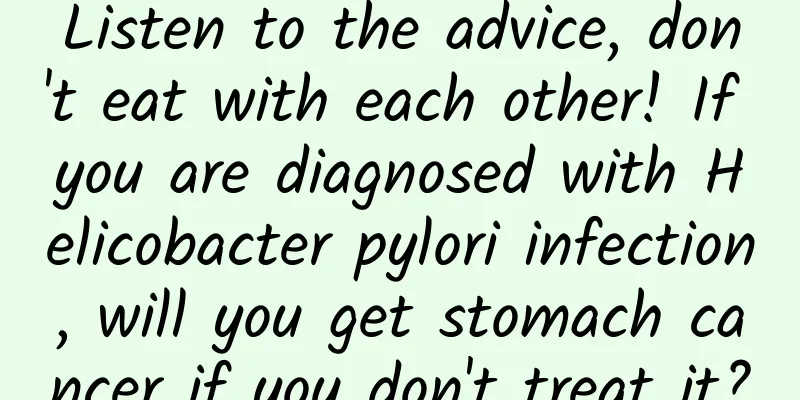Listen to the advice, don't eat with each other! If you are diagnosed with Helicobacter pylori infection, will you get stomach cancer if you don't treat it?

|
When we are over 30, we are reminded that we are no longer young. In addition to the thinning hair And the increasingly fragile stomach Stomach pain, nausea, acid reflux... Why does my stomach become sick when it is in good condition? In fact, it is likely contaminated. A bacteria called Helicobacter pylori. Today, Dr. i will reveal the “true face” of Helicobacter pylori and help everyone fully understand this disease. Helicobacter pylori infection is the most common bacterial infection According to the Chinese Center for Disease Control and Prevention in 2023 Infectious Disease Prevention and Control Institute, etc. The data released by the China Helicobacter pylori Infection Prevention and Control show that The Helicobacter pylori infection rate in my country is nearly 50%. Especially in areas with poor sanitary conditions, Helicobacter pylori infection is more common. The infection rate is so high How is Helicobacter pylori spread? Helicobacter pylori is mainly transmitted through the oral-oral or fecal-oral route, such as sharing eating utensils, kissing, or ingesting the saliva of an infected person. As early as 1994, the World Health Organization Helicobacter pylori is listed as The No. 1 carcinogen that causes gastric cancer In 2021, the U.S. Department of Health and Human Services Helicobacter pylori is clearly listed as a Class 1 carcinogen So, is infection so terrible? Being infected with Helicobacter pylori does not mean that you will definitely get stomach cancer in the future. The probability of getting stomach cancer is about 1% because there are many other causes of stomach cancer, such as environmental factors, genetic factors, lifestyle habits, bad eating habits, overweight, alcoholism, smoking, etc. are all risk factors for stomach cancer. Netizen: I feel relieved when I hear the doctor say this, but how do I know if I am infected? There are two main clinical testing methods: 1. Breath test (C-13 or C-14 urea breath test), which can be completed by just blowing out of your breath. 2. Gastroscopy: monitor the overall condition of the stomach, esophagus, and duodenum. It is recommended that people over 40 years old undergo this examination regularly. Numerous studies have shown that eradication of Helicobacter pylori infection can promote the healing of peptic ulcers and reduce the incidence of ulcer complications. It can also relieve about 80% of early gastric MALT lymphoma. Eradicating Helicobacter pylori before gastric mucosal atrophy and/or intestinal metaplasia can block the process of "intestinal type gastric cancer evolution" in the Correa model and almost completely eliminate the risk of intestinal type gastric cancer [6]. Therefore, eradication of Helicobacter pylori infection is a primary preventive measure for gastric cancer. Eradicating Helicobacter pylori 1. my country's guidelines recommend the use of a quadruple regimen containing bismuth in the initial and secondary eradication treatment of infection, that is, a combination of 1 bismuth agent + 2 antibiotics + 1 proton pump inhibitor. Patients need to take the medicine on time under the guidance of a doctor and pay attention to the side effects and interactions of the drugs. Bismuth agents: such as colloidal bismuth pectin, potassium bismuth citrate, etc., can protect the gastric mucosa and improve the eradication rate. Antibiotics: such as amoxicillin, tetracycline, etc. Proton pump inhibitors: such as omeprazole, ilaprazole, etc., can inhibit gastric acid secretion. In addition, a high-dose dual therapy, i.e., high-dose amoxicillin + high-dose CPV inhibitor, can also be used. 2. Improve your lifestyle: During the treatment, patients need to pay attention to improving their lifestyle, including quitting smoking, drinking, and excessive consumption of spicy and greasy foods; pay attention to food hygiene, wash hands frequently, and do a good job of disinfecting the kitchen. Prevention and eradication of Helicobacter pylori requires comprehensive consideration of multiple aspects, including improving living habits, paying attention to personal hygiene, receiving regular examinations and treatment, etc. Only by taking comprehensive measures and correctly choosing drug treatment plans can the infection and spread of Helicobacter pylori be effectively controlled and prevented. Q: If I am infected with Helicobacter pylori but don’t feel any symptoms, do I still need treatment? want. First, the absence of symptoms does not mean there is no impact; second, it will increase the risk of transmission to family members and children. The prevention and control of Helicobacter pylori infection should focus on reasonable diagnosis and treatment and eradication therapy. Once Helicobacter pylori infection is detected, eradication therapy should be encouraged if there are no countervailing factors. Eradication therapy for Helicobacter pylori can reduce or eliminate the various effects of long-term chronic inflammation caused by Helicobacter pylori. Eradication therapy can also bring significant social benefits, such as reducing the source of infection, reducing transmission within the family and the population, and can effectively reduce the incidence and disease burden of related diseases such as gastric cancer and improve the quality of life. I have seen so much If you are lucky you haven't been infected yet So how do we protect ourselves in life? Preventing Helicobacter pylori infection 1. Adopt the system of separate meals or use serving chopsticks: Helicobacter pylori is mainly transmitted through mouth-to-mouth, so adopting the system of separate meals or using serving chopsticks when dining at home or in groups can effectively reduce the risk of cross-infection. 2. Pay attention to oral hygiene: Regular brushing, flossing and mouthwash can help remove bacteria in the mouth and reduce the risk of infection. 3. Pay attention to food hygiene: avoid eating raw food, drinking raw water, avoiding spicy and greasy food and long-term heavy drinking. 4. Prevent mother-to-child transmission: Avoid mouth-to-mouth feeding of infants and do not chew food before feeding it to infants. 5. Develop good hygiene habits: wash your hands before meals, after defecation, and after contact with pollutants, and avoid sharing personal items with others, such as toothbrushes, razors, etc. 6. Get regular checkups: Regular Helicobacter pylori testing can detect infection early, provide timely treatment, and prevent the disease from getting worse. For high-risk groups, such as patients with stomach problems and those with a family history of Helicobacter pylori infection, regular checkups are even more important. Once diagnosed, please go to the gastroenterology department in time. Further diagnosis and treatment under the guidance of professional doctors So as not to accompany you for life And spread it to family and friends Author: Zeng Xianhui, a third-level expert in gastroenterology at West China Fourth Hospital, Sichuan University 【References】 1.Malfertheiner, P., et al., Management of Helicobacter pylori infection: the Maastricht VI/Florence consensus report. Gut, 2022. 2.Lee, YC, et al., Association Between Helicobacter pylori Eradication and Gastric Cancer Incidence: A Systematic Review and Meta-analysis. Gastroenterology, 2016. 150(5): p. 1113-1124.e5. 3. Thrift, AP, TN Wenker, and HB El-Serag, Global burden of gastric cancer: epidemiological trends, risk factors, screening and prevention. Nat Rev Clin Oncol, 2023. 20(5): p. 338-349. 4.Wang, F., et al., Helicobacter pylori-induced gastric inflammation and gastric cancer. Cancer Lett, 2014. 345(2): p. 196-202. 5.US Department of Health and Human Services. 15th Report on carcinogens. Available at: http://ntp.niehs.nih/. gov/go/roc. Accessed 21 December 2021. 6.Rugge, M., et al., Gastric Cancer as Preventable Disease. Clin Gastroenterol Hepatol, 2017. 15(12): p. 1833-1843. |
<<: Brugada syndrome: the “big killer” of sudden death late at night
>>: The little pendulum in the heart - myxoma The little pendulum in the heart - myxoma
Recommend
My period has not come for more than ten days
Menstruation is very important for women. It is a...
Can morning urine be used to detect ovulation?
Female friends who want to detect ovulation canno...
Can non-smokers get lung cancer? Oral bacteria may be the driving force behind it! British research reveals
Recently, a study published in the British Medica...
What causes itching in female urethra?
In recent days, some female netizens have been as...
What is the reason for the lack of fetal movement in pregnant women?
Fetal movement refers to the movement of the fetu...
What dishes are suitable for people with internal heat?
Getting angry refers to excessive yang energy in ...
How can women nourish their liver and kidneys?
As women in modern society become more and more o...
Health care methods for middle-aged women
No matter what age group women are in, they are a...
What sanitary napkins can cure gynecological diseases
The use of sanitary napkins is relatively common,...
Why do women get tired easily?
Women have heavy workloads every day as they have...
How to wear colored contact lenses easily and quickly
Wearing colored contact lenses can make our eyes ...
Can I eat hot pot if I have a lot of dampness? How to make cheese hot pot?
Eating hot pot can promote the timely discharge o...
What should I do if I have an unexpected miscarriage?
For pregnant women, the biggest worry in daily li...
What causes frequent urination in women?
Generally speaking, it is men who have frequent u...
How long in advance should I buy Gulangyu ferry tickets? What are the differences between different prices of Gulangyu ferry tickets?
Gulangyu is a tourist attraction in Xiamen. It wa...






![[Diet and Health] Do you know the effects of lemon soaked in honey?](/upload/images/67ce22f3f13a8.webp)


![[Medical Q&A] How do “diabetic moms” manage their blood sugar after childbirth?](/upload/images/67f0e91aa1307.webp)